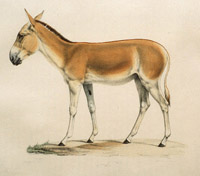
Erforschung biologischer Ressourcen der Mongolei / Exploration into the Biological Resources of Mongolia, ISSN 0440-1298
Date of this Version
2005
Document Type
Article
Citation
Erforschung biologischer Ressourcen der Mongolei (2005) 9: 281-310.
Proceedings of the symposium ”Ecosystem Research in the Arid Environments of Central Asia: Results, Challenges, and Perspectives,” Ulaanbaatar, Mongolia, June 23-24, 2004.
Ergebnisse der Mongolisch-Deutschen Biologischen Expeditionen seit 1962, No. 215
Abstract
The different plumage characteristics of the Mongolian Saker Falco cherrug milvipes and the nominate race F. ch. cherrug are discussed. It could be shown that both races are polymorphic. According to Baumgart (1997), Sakers don’t need uniform plumages because they live on nearly blind voles. Due to that there seems to be no selection pressure from victims side. The same phenomenon is observable with Buteo buteo and the typical Mongolian Buteo hemilasius.
Whereas young Sakers of the nominate race cherrug equal more or less already adults, are the differences in the plumage of juv. and ad. milvipes great enough. Otherwise are the juvenile plumage of both races not always possible to distinguish. Juv. milvipes however, have on the upper side stronger undulating lines. Still unsolved is the taxonomic status of a dark phase of milvipes; this bird was formerly regarded as independent species. Today this phase belongs to milvipes.
Due to DNA-tests Ellis (1995) came to the conclusion that the ”core-group” of F. altaicus in reality represents a hybrid-population of Falco rusticolus and F. cherrug, into which meanwhile much F. cherrug was interbred. His thesis get another argument due to the fact that the geographical range in which this core-group lives, is much smaller than expected.
The plumage characteristics of the Altai-falcons resemble - apart from their darker ground color--other Sakers. They are different from darker phases of F. rusticolus.
Until now Mongolia is fortunately free of artificial hybrids.
Included in
Asian Studies Commons, Biodiversity Commons, Desert Ecology Commons, Environmental Sciences Commons, Nature and Society Relations Commons, Ornithology Commons, Other Animal Sciences Commons, Poultry or Avian Science Commons, Zoology Commons


Comments
Copyright 2005, Martin-Luther-Universität. Used by permission.